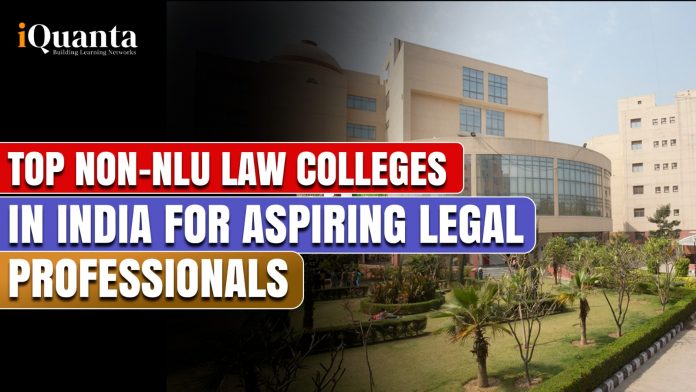In the past few years, the landscape of legal education in India has undergone tremendous change, and NLUs have set the benchmark in this respect. However, the competition is fierce and seats are limited for law aspirants through entrance tests like CLAT. So admission is tough for aspiring candidates. Thankfully, India has several non-NLU accredited law colleges that offer really good legal education with quality faculties and bright job prospects. The present article analyzes some of the best non-NLU law colleges in India, focusing on the salient features, academic programs, and placement prospects of these colleges.

1. Symbiosis Law School (SLS), Pune:
Symbiosis Law School (SLS), Pune, is one of the leading private law institutions in India. Established in 1977, it functions under the aegis of Symbiosis International University and is extremely well-known for academic excellence, world-class infrastructure, and a lively campus life.
Key Features:
- Courses Offered: SLS Pune offers undergraduate courses (BA LLB, BBA LLB), postgraduate (LLM) courses, and diploma courses in specialized fields of intellectual property law, cyber law, and business law.
- Faculty: The college is well-staffed with veteran academicians and experienced legal professionals.
- Moot Court Competitions: SLS Pune takes part actively in national and international moot court competitions, thereby giving students a chance to learn practical skills in legal pleading.
- Career Opportunities: The institute has a good placement record of placing students with leading law firms, corporate houses, and legal consultancies. The average salary package is INR 8-12 lakhs annually.
- Research & Publication: SLS Pune encourages legal research through specialized centers such as the Centre for Human Rights and the Centre for Corporate and Competition Law.
Why Choose SLS Pune?
SLS Pune is a top university for students hoping to pursue professions in corporate law, litigation, or academics because of its emphasis on the total development of its students and its close connections to the legal sector.
2. Faculty of Law, University of Delhi
One of India’s oldest and most prominent law schools is the University of Delhi’s Faculty of Law. Since its founding in 1924, it has produced some of the nation’s best legal minds.
Key Features:
- Courses Offered: Undergraduate (LLB), Masters (LLM), and Doctorate Courses. Specialisations, such as Labor Law, Human Rights, and Environmental Law, are also offered as diploma courses.
- Faculty: The institution boasts some of the most distinguished legal scholars and practitioners in the country.
- Reputation: The Faculty of Law is an establishment of reputation for excellence in teaching and contributing to policy-making and legal research.
- Placements: The Faculty of Law has highly sought-after alumni who are appointed in prominent law firms, judiciary services, and public sector undertakings.
- Alumni Network: The institution prides itself on having a strong alumni network, and many of its graduates are now key players in the legal profession, judiciary, and government.
Why Faculty of Law, University of Delhi?
Tradition, academic excellence, and locational advantage of being right in the heart of the national capital have made it the first choice of students aspiring to become stars in litigation, the judiciary, or public service.
3. ILS Law College, Pune
ILS Law College, founded in 1924, is one of India’s oldest and most reputed law colleges. It is affiliated to Savitribai Phule Pune University and has a great legacy of producing notable lawyers, judges, and scholars.
Key Highlights:
- Courses Offered: ILS offers undergraduate courses (BA LLB, BBA LLB) and postgraduate (LLM), as well as diploma courses in specialized areas such as taxation law and labour law.
- Faculty: The institution has a very competent faculty comprising former judges and eminent legal practitioners.
- Moot Court and Competitions: ILS has a well-established moot court culture, where students continue to shine in national as well as international competitions.
- Career Opportunities: The college’s placement cell provides the students with firsthand opportunities to intern and work in some renowned law firms, corporates, and NGOs.
- Research & Publications: ILS publishes the Indian Law Society’s Law Review, a reputed legal journal, which carries work from many eminent legal scholars.
Why ILS Law College?
With its legacy, academic excellence, and practical legal training, ILS would be an ideal choice for students aspiring for careers in litigation, corporate law, or academia.
4. Jindal Global Law School (JGLS), Sonipat
Founded in 2009, Jindal Global Law School is a constituent institution of O.P. Jindal Global University. With its global outlook and interdisciplinary approach to legal education, JGLS has swiftly carved out for itself the stature of being one of the leading private law schools across India.
Key Features:
- Programs Offered: JGLS offers undergraduate (BA LLB BBA LLB), postgraduate (LLM), and doctoral (PhD) programs, and various specialized courses in international trade law, human rights law, and environmental law.
- Faculty: The faculty includes a mix of international scholars and practitioners of law.
- Global Exposure: With its partnerships with several leading law schools across the globe, JGLS provides opportunities for exchange programs, internships, and research for its students.
- Placement: The college boasts a very good placement record, with its alumni working in top-tier law firms, multinational corporations, and international organizations.
- Infrastructure: JGLS is blessed with world-class infrastructure, including a modern library, moot court halls, and research centers.
Why Choose JGLS?
With a global outlook, interdisciplinary curriculum, and strong emphasis on research, JGLS stands as the best choice for students intending to contribute to international law, corporate law, or academia.

5. Amity Law School, Delhi
Established in 1999, it is the institution that comes directly under Amity University. However, the current modern teaching patterns and industry-friendly curriculum are appreciable.
Essential Features
- Programmes: Undergraduate Programme-BA LLB and BBA LLB; Post Graduation – LL.M.; And also offers PG Diplomas (Intellectual property law and Cyber law).
- Faculty: Amity Law School incorporates the best of the academic scholars and legal professionals to provide theoretical knowledge along with the practical competencies.
- Career Opportunities: The university has an excellent placement record with students from Amity Law School hired by renowned law firms, corporate organizations, and legal consultancies.
- Facilities: The campus boasts updated infrastructural facilities, technologically sophisticated classrooms, moot court halls, and an extensive library.
Why Join Amity Law School?
Its focus on hands-on training, industry partnerships, and innovative educational methods makes it an excellent choice for students aiming for careers in corporate law or litigation.
6. Christ University, Bangalore
School of Law at Christ University started in 2006. It has a strong ethos of comprehensive legal education and principles of ethics.
Key Features:
- Courses: Undergraduate (BA LLB, BBA LLB), master’s (LLM), and diploma courses in specialties like human rights law and environment law are provided.
- Faculty: Distinguished faculty consists of experienced academicians and seasoned professionals in the legal field.
- Career Opportunities: S. Career Development: Christ University has excellent placement records with students being placed in the top-ranked law firms, multinational companies, and NGOs across the country.
- Research and Publications: The school of law supports research work through the centers of excellence and publishes the Christ University Law Journal.
Why choose Christ University?
Its commitment to ethical learning, all-round development, and industry engagement makes it a top choice for students aiming for careers in litigation, corporate law, or public service.
Conclusion-
NLUs have set standards for legal education in India. However, several non-NLU law schools provide commensurate academic programs, industry exposure, and career opportunities. Symbiosis Law School, ILS Law College, Amity Law School, and Christ University have produced some very competent legal minds who have carved their names in fields ranging from litigation to corporate law, judiciary, and legal research.
While these law schools offer a very stringent academic atmosphere, practical learning is made possible via moot courts, research centers, and internships. Their high placement records speak volumes for their credibility of producing a successful legal career. With state-of-the-art facilities, industries’ help, and a strong emphasis on ethics, these law schools are highly favored amongst law aspirants. Those aspirants who are not able to get into a NLU, these institutions act as an excellent counterpoint, not sacrificing the quality of education and opportunities. The choice of a law school is quite crucial, and these non-NLU colleges form a stepping stone toward a flourishing legal career.


